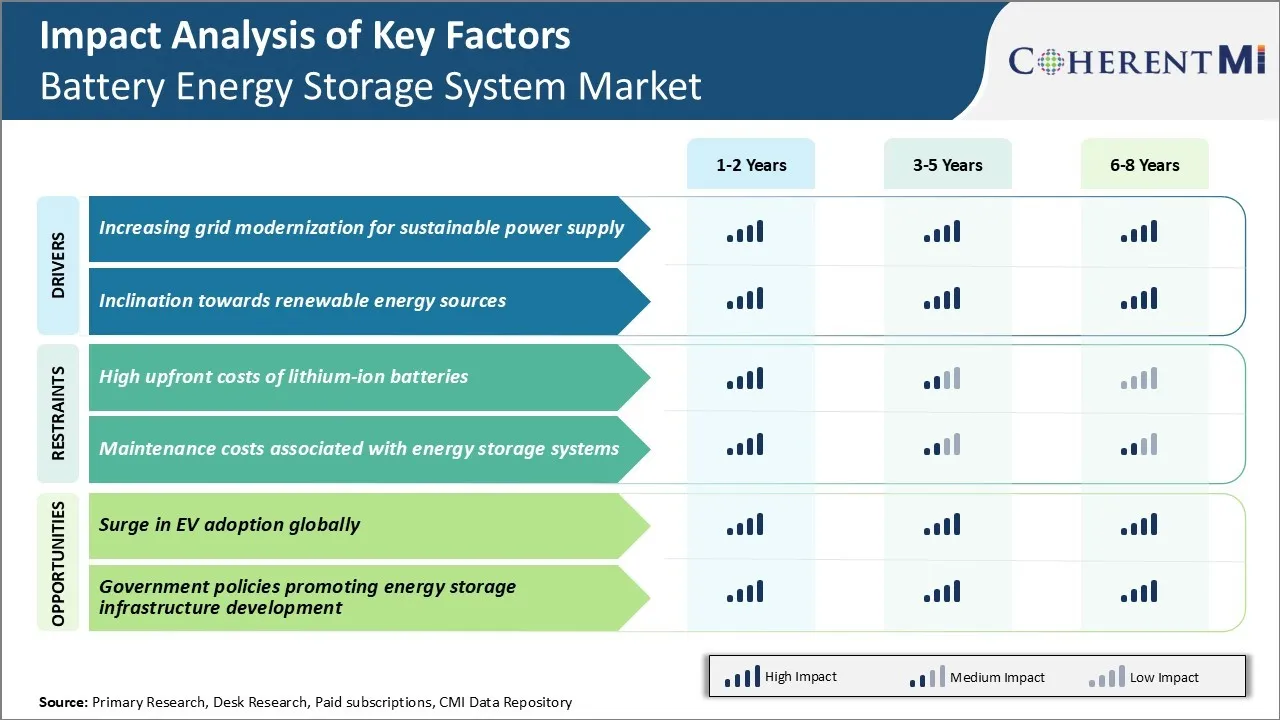Battery Energy Storage System Market Trends
Market Driver - Increasing Grid Modernization for Sustainable Power Supply
With rise in population and increased industrialization, the demand for power is rising exponentially. Many countries are facing challenges to meet the growing demand as conventional power generation methods are limited. Advanced technologies such as battery energy storage systems play a crucial role in achieving the goals of grid modernization.
Battery energy storage systems act as a buffer by storing power when renewable production is high and supplementary power source when generation drops. It enhances the usability of clean power and allows for greater renewable integration within the existing electric grid framework. The capability to store energy from variable resources for use during demand peaks or grid failure makes battery energy storage systems key enablers for modern power infrastructure.
Investments in battery storage are thus integral to ongoing modernization programs worldwide. Strategic deployment of these flexible resources can fundamentally transform the grid into a smarter, sustainable and climate-friendly system. This is expected to drive growth of the battery energy storage system market.
Market Driver - Inclination Towards Renewable Energy Sources
According to projections, renewables are likely to contribute over 50% of total new power installation by 2050 globally. This massive scale transition brings opportunities as well challenges that battery energy storage systems can help address.
Proliferation of renewable power plants impacts grid operations as solar and wind power output fluctuates with weather and time of the day. However, restricting renewable curtailment is critical to meeting sustainability goals. Battery energy storage emerges as an attractive solution for this variability issue. Batteries can absorb excess generation from resources like solar during sunlight hours and discharge after sunset to supplement supply. For wind as well, they offset peaks and troughs in output helping grid integrate higher shares of this intermittent power source.
Batteries on site along renewables act as an energy management interface enabling seamless integration of distributed systems into centralized grid operations. Such localized battery energy storage systems facilitate clean self-consumption of power, reduces grid congestion and cost of transmission infrastructure expansion. This will continue to support growth of the battery energy storage system market in coming years.

Market Challenge - High Upfront Costs of Lithium-ion Batteries
One of the key challenges currently facing the battery energy storage system market is the high upfront costs of lithium-ion batteries. Lithium-ion batteries are considered crucial for energy storage applications due to their high energy density and long lifespan.
However, lithium-ion batteries also have significantly higher costs compared to other battery chemistries. The high content of cobalt and other rare earth materials needed for their production adds to these costs. At present, lithium-ion batteries can account for over 50% of the total upfront capital costs for large-scale energy storage projects. This high initial investment poses a hurdle for many potential commercial and industrial consumers to adopt battery energy storage systems.
Providers in the battery energy storage system market will need to drive down the costs of lithium-ion battery packs. It can be done through innovations in battery chemistry and manufacturing in order to make these systems more cost-competitive compared to traditional power generation sources. They may also offer innovative leasing options or long-term service contracts to help lower the financial barriers for customers.
Market Opportunity - Surge in EV Adoption Globally
One significant market opportunity for the battery energy storage industry is the surge in global adoption of electric vehicles. Most projections estimate that EVs will comprise a significant percentage of total vehicle sales worldwide within the next decade as concerns over emissions and fossil fuel dependence increase. This rising EV market will drive massive demand for lithium-ion battery production to meet these vehicles' energy storage needs.
While a majority of this demand will be absorbed by the automotive industry initially, it is also likely to result in economies of scale for lithium-ion battery manufacturing. This scale could facilitate reductions in battery costs over time and make battery storage technologies more viable for other applications. The boom in EV battery manufacturing may very well drive down costs to a point where energy storage becomes competitive with traditional generators across many use cases.